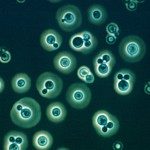Présentation
Most Cryptococccus neoformans genes are interrupted by introns, and alternative splicing occurs very often. In order to gain deeper insights into the distribution of introns in the C. neoformans genome, we have used RNA-Seq technology to identify more than 40,000 small introns (median size = 56 nt) in more than 99% of the expressed genes of C. neoformans var. grubii. Although most of these introns are located in the coding DNA sequences, over 2,000 introns were also identified in the untranslated regions. The roles of these introns in the biology and virulence of C. neoformans represents one of the main orientations of our current research program. We have shown that introns are essential for gene expression in C. neoformans and that an mRNA transcribed from an intronless allele is degraded in the nucleus through a Pab2p-dependant degradation pathway. For most of the genes investigated, elimination of introns greatly reduces mRNA accumulation. The number and the position of introns modulate the gene expression level in a cumulative manner. We are currently studying the function of Pab2p in this degradation pathway. We are interested in the pathways regulating alternative splicing in C. neoformans. Although different types of alternative splicing (exon skipping, alternative 3’ or 5’ splice site selection, or intron retention) can be identified, intron retention is the most common event. As most introns contain in-frame stop codons, intron retention results in the presence of premature stop codons (PTC) in the corresponding mRNAs. These PTC-containing mRNA should theoretically be degraded by the non-sense mediated mRNA degradation (NMD) pathway. We have identified several conserved elements of the NMD pathway in C. neoformans and we are studying the importance of these elements for the regulation of alternative splicing. The evolutionary conservation of intron position in two very closely related C. neoformans varieties is being studied using an “in house” RNA-Seq informed annotation of the C. neoformans var. neoformans genome


